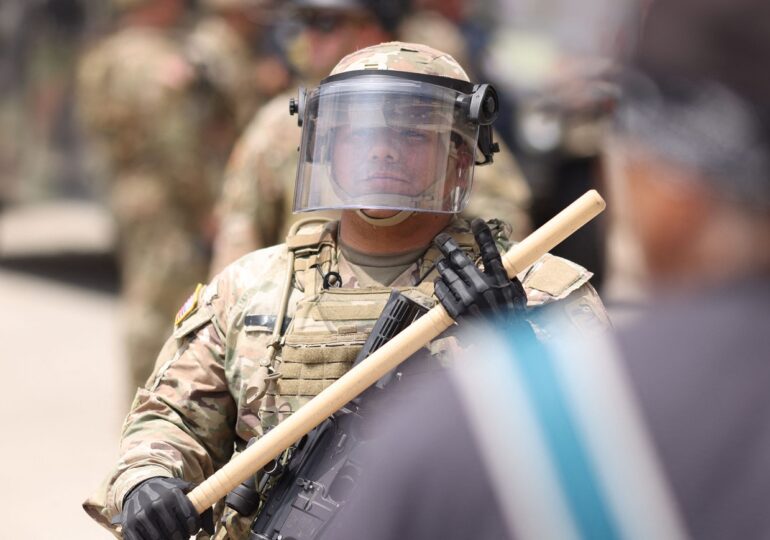President Donald Trump’s order to deploy Marines to the protest-ridden streets of Los Angeles will put US troops in an extremely difficult situation. It will be a confrontation between the military and civilians, and one wrong step could lead to a catastrophe. The soldiers will have a tough decision to make.
When a president sends the country’s military against the population, the soldiers are put in a complex situation. As proven in Romania during the events of ’89, armed forces can receive orders that violate national laws, even international ones regarding crimes against humanity, or they can receive abusive directives.
What seemed like a movie scenario could soon turn into reality on the streets of Los Angeles, where President Donald Trump has deployed 700 Marines. It is a rare deployment at the national level not seen since 1992, when George Bush sent the military to quell racial clashes in Los Angeles.
A soldier would violate a legal but unethical order - in the sense that it violates the professional code of an officer? We might be on the verge of finding out, writes Dr. Joshua Braver, an assistant law professor at the University of Wisconsin-Madison, who studies civilian-military relations, in an article published by Washington Post.
The Marines have been sent to Los Angeles to help protect "federal functions and properties," as specified in President Trump's memorandum - not to engage in broader internal policing activities. But this could change quickly.
The military must be the last resort
Generally, if the president were to order members of the military to engage in internal policing activities, the order would be almost certainly legal. Not only does the president have the constitutional authority to protect federal property and functions, but the Insurrection Act of 1807 also sets a very low bar for military deployment for the purpose of enforcing domestic law. Additionally, military ethics dictate that officers must obey legal orders.
All of this suggests that officers should comply if ordered to engage in internal policing activities.
If the president were to order officers to engage in internal policing activities that are unnecessary (as they could be adequately handled by local law enforcement), politically partisan, or reckless, the order would almost certainly be legal - but, according to the professional code of officers, it would also be unethical. And military ethics dictate that officers must reject unethical orders.
However, military personnel in such a situation may find themselves caught in a contradiction: their professional duty would oblige them to both obey and defy.
American military and professional ethics require impartiality, so the military does not become a political instrument and does not jeopardize its purpose of serving the national interest.
The same ethics also strive to limit the military's conduct to its area of expertise - namely, combat. The military's primary competence is defeating enemies in life-and-death battles; for soldiers, Marines, and sailors, killing is often a victory. The same cannot be said for internal policing, where the goal is to minimize the use of lethal force as much as possible.
As their expertise is limited in this way, the armed forces have "carefully delineated roles in law enforcement," as explained in a 2022 open letter signed by a bipartisan group of former Defense secretaries and Chairmen of the Joint Chiefs of Staff.
The use of active forces in a law enforcement role should only be done "as a last resort," explained Mark Esper, Secretary of Defense at the end of the first Trump administration, in a press conference where he announced his opposition to military deployment domestically during the civil unrest in the United States in 2020. Not coincidentally, Trump later removed him from office.
The eternal dilemma of soldiers
What should officers do if they are legally ordered to violate their professional ethics? Within the armed forces, the US Army's doctrine addresses the most comprehensive issue and provides little help, the expert points out. Here is what it states: "We serve honorably - in accordance with Army ethics - under civilian authority, while also respecting the nation's laws and all legal orders; additionally, we reject and report illegal, unethical, or immoral orders or actions."
This excerpt simultaneously conveys obedience and disobedience to legal but unethical orders, leaving officers with no clear answer on how to act, notes Braver.
It is the "eternal dilemma" that the military faces, especially when they must intervene against civilians.
Experts in civil-military relations have engaged in a lengthy debate on this issue. Advocates for obedience emphasize the importance of civilian control over the military. Supporters of disobedience respond that military ethics protect not only civilian control over the military but also against its abusive use by civilians. The most prominent researcher in civil-military relations, political scientist Samuel P. Huntington, suggested that the dilemma cannot be resolved.
Trump broke the safety net, the decision falls directly on officers
In recent years, when this issue threatened to strain civil-military relations in the United States, senior authorities intervened to defuse the crisis - such as when Mark Esper publicly invoked the ethical principles of the military to oppose military deployment domestically in 2020. Esper may have spared military personnel from deciding whether to obey a direct order.
In his second term, Trump was more careful in placing loyalists in positions of authority. This means that the issue of ethical resistance may no longer hang on a high-level safety net and may directly fall on the shoulders of officers on the ground.
They may be forced to choose between obedience and professional integrity, between their duty to the commander-in-chief and their duty to the American people. It is a tragic situation - for them, for the military, and for American democracy, notes Braver.
If Trump does not back down, the military will be caught in the middle, in a nightmare scenario. In front of the soldiers will be civilians, behind them will be superiors and orders "from above."

